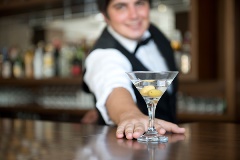Hospitality + Entertainment Insurance

Hospitality + Entertainment Insurance

Helping you serve your customers, so they can continue to serve theirs.
Amwins' specialists collaborate to bring an in-depth understanding of hospitality and entertainment risk.
In-house hospitality & entertainment programs + exclusive products
In-house actuarial + CAT modeling team
Our in-house team of actuaries licenses cutting-edge software to deliver catastrophe risk data analysis and the most accurate pricing possible.
Complex claims advocacy
From designing a proactive claims management plan to engaging on difficult and complex claims, Amwins supports our clients when they need us the most.
Legal counsel access
Amwins offers access to legal counsel, including advising and representation to help protect your clients' assets.
$1.3B
annual premium placements
86
hospitality & entertainment market relationships
25,000
accounts bound annually
Hospitality + Entertainment insurance resources + insights
Stay up to date on emerging industry trends and topics.
Four Factors that Determine Pricing For Liquor Liability Insurance Coverage
It’s no secret that liquor liability is a complex coverage. There are numerous variables that underwriters take into consideration when pricing and structuring a policy. The more informed you are about the underwriting thought process for liquor liability risks, the better able you are to position your clients for optimal terms and pricing.
There are several variables to the complexity of liquor liability. First, there are 50 states with 50 different sets of laws governing liquor liability, ranging from strict liability (Alabama) to very little liability (Nevada). Second, there is a wide range of venue types – from restaurants to nightclubs to concerts – which all have specific nuances that need to be addressed. Finally, each specific location has its own unique underwriting concerns that will arise, and it is critical to address them fully when submitting a risk to market.
The Purpose of Liquor Liability
The principal idea of liquor liability insurance is to protect a licensed purveyor of alcoholic beverages from third party liability. Liabilities for these establishments share some common characteristics. Typically, liability arises when a venue over-serves, serves minors, serves a known drunk, or serves an individual who is involved in a drunk driving incident after he or she was served on premises. Venues also have significant exposure to assault and battery claims from either employees being overly rough with patrons or patrons assaulting other patrons.
Factors That Determine Coverage Pricing
There are a host of different factors that go into the rating and pricing of this coverage.
1. Type of Venue
The most basic way of looking at risk factors for different venues is simply to identify what the primary purpose of the venue is – whether it is a restaurant, bar/tavern, nightclub, concert, and so on. If a restaurant’s primary purpose is serving food in a sit-down environment, it is considered to be much less risky than a nightclub with a primary purpose of entertainment and dancing. A bar/tavern may provide a mix of both, which places its risk factor in between a restaurant and a nightclub. Other venues that need a liquor liability policy are concerts, special events, country clubs, and fraternal organizations – essentially, anyone who is charging the general public for liquor.
2. Location of venue
State liquor laws vary dramatically by venue and jurisdiction. States each have their own basic scoring system based on the punitive nature of their dram shop law. Simply put, dram shop laws are laws that impose certain liability standards on the venues that serve alcohol. Tough jurisdictions, such as District of Columbia or Alabama, impose the toughest standards on venues when it comes to proving that they didn’t contribute to a third party bodily injury or property damage claim. Other jurisdictions, such as Nevada or Delaware, are more favorable to venues, and it is very difficult to prove the venue contributed to negligence. It is important to understand the varying dram shop laws associated with each venue as it will better help gauge the customer’s expectations and ability to find adequate coverage.
Individual traits of the risk: What controls are in place? How the operation is run by management?
3. Percentage of liquor sales
Further complicating the realm of liquor liability coverage is the percentage of the alcohol sales; as would be expected, more liquor sales equate to higher premiums. A restaurant with a high percentage of alcohol sales may be classified as more of a bar. A bar with a dance floor plus high liquor sales may be classified as a nightclub. When submitting a risk for liquor liability coverage, it’s important to review the specifics so you know what to expect from underwriters.
4. Individual traits of the risk
Below are some additional variables which underwriters will take into consideration.
- What types of entertainment are on premises - live music, karaoke, mechanical bull?
- What is the average age of patrons; what is the proximity to a college?
- What is the experience level of management?
- What are the formal controls or loss prevention procedures?
- Is security a third-party vendor with separate limits of insurance, or the venue’s own employees?
- Does the venue do background checks on employees, especially bouncers/security?
- What is the security-to-patron ratio?
- What training does the serving staff undergo?
- Does the venue allow minors? If so, what are the control procedures?
- Are there security cameras?
- What is the procedure for dealing with intoxicated patrons?
In short, liquor liability is a complex coverage that is becoming harder and harder to procure, but with a proper understanding of the type of risk, venue and location, you can more effectively position your client for success with underwriters.
- Casualty
- Hospitality & Entertainment
- Property & Casualty


